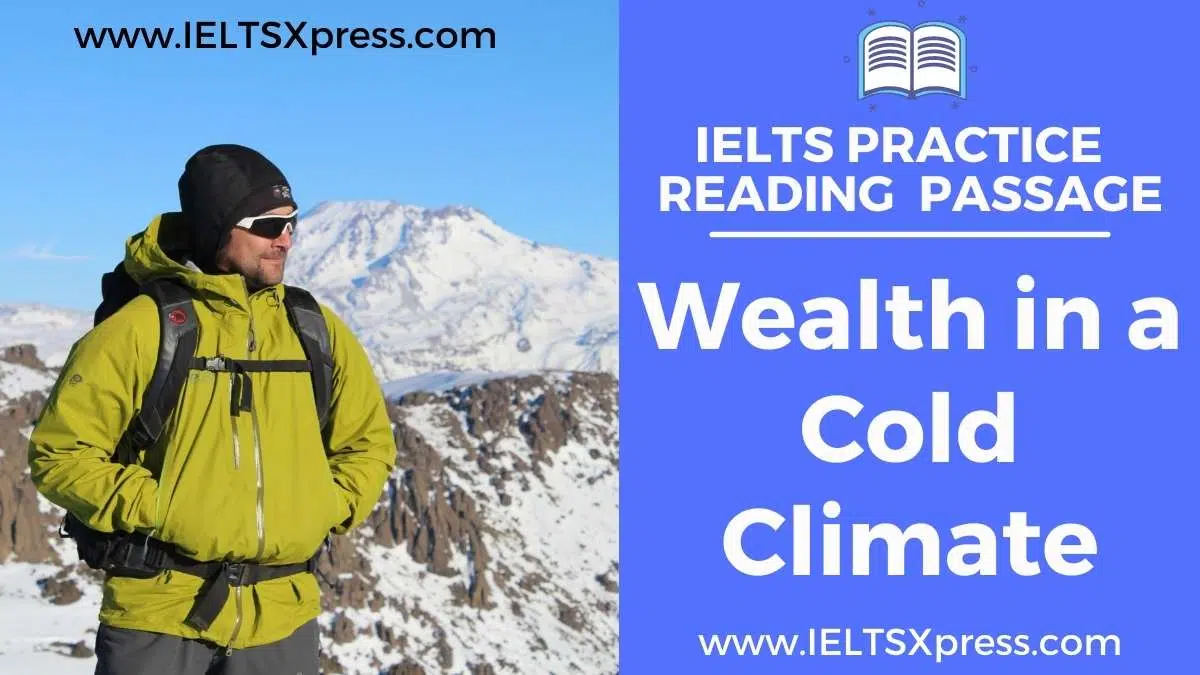Wealth in a Cold Climate IELTS Reading Passage with Answers
Reading Passage 2
Wealth in a Cold Climate
A Dr. William Masters was reading a book about mosquitoes when inspiration struck. “There was this anecdote about the great yellow fever epidemic that hit Philadelphia in 1793,” Masters recalls. “This epidemic decimated the city until the first frost came.” The inclement weather froze out the insects, allowing Philadelphia to recover
B If the weather could be the key to a city’s fortunes, Masters thought, then why not to the historical fortunes of nations? And could frost lie at the heart of one of the most enduring economic mysteries of all — why are almost all the wealthy, industrialised nations to be found at altitudes above 40 degrees? After two years of research, he thinks that he has found a piece of the puzzle. Masters, an agricultural economist from Purdue University in Indiana, and Margaret McMillan at Tufts University, Boston, show that annual frosts are among the factors that distinguish rich nations from poor ones. Their study is published this month in the Journal of Economic Growth. The pair speculates that cold snaps have two main benefits — they freeze pests that would otherwise destroy crops and also freeze organisms, such as mosquitoes, that carry disease. The result is agricultural abundance a big workforce
C The academics took two sets of information. The first was average income for countries, the second climate data from the University of East Anglia. They found a curious tally between the sets. Countries having five or more frosty days a month are uniformly rich; those with fewer than five are impoverished. The authors speculate that the five-day figure is important; it could be the minimum time needed to kill pests in the soil. Masters says: “For example, Finland is a small country that is growing quickly, but Bolivia is a small country that isn’t growing at all. Perhaps climate has something to do with that.” In fact, limited frosts bring huge benefits to farmers. The chills kill insects or render them inactive; cold weather slows the break-up of plant and animal material in the soil, allowing it to become richer; and frosts ensure a build-up of moisture in the ground for spring, reducing dependence on seasonal rains. There are exceptions to the “cold equals rich” argument. There are well-heeled tropical countries such as Hong Kong and Singapore (both city-states, Masters notes), a result of their superior trading positions. Likewise, not all European countries axe moneyed — in the former communist colonies, the economic potential was crushed by politics.
D Masters stresses that climate will never be the overriding factor 一 the wealth of nations is too complicated to be attributable to just one factor. Climate, he feels, somehow combines with other factors — such as the presence of institutions, including governments, and access to trading routes — to determine whether a country will do well. Traditionally, Masters says, economists thought that institutions had the biggest effect on the economy because they brought order to a country in the form of, for example, laws and property rights. With order, so the thinking went, came affluence. “But there are some problems that even countries with institutions have not been able to get around,” he says. “My feeling is that, as countries get richer, they get better institutions. And the accumulation of wealth and improvement in governing institutions are both helped by a favourable environment, including climate.
E This does not mean, he insists, that tropical countries are beyond economic help and destined to remain penniless. Instead, richer countries should change how foreign aid is given. Instead of aid being geared towards improving governance, it should be spent on technology to improve agriculture and to combat disease. Masters cites one example: “There are regions in India that have been provided with irrigation — agricultural productivity has gone up and there has been an improvement in health.” Supplying vaccines against tropical diseases and developing crop varieties that can grow in the tropics would break the poverty cycle.
F Other minds have applied themselves to the split between poor and rich nations, citing anthropological, climatic and zoological reasons for why temperate nations are the most affluent. In 350BC, Aristotle observed that “those who live in a cold climate . . . are full of spirit”. Jared Diamond, from the University of California at Los Angeles, pointed out in his book Guns, Germs and Steel that Eurasia is broadly aligned east-west, while Africa and the Americas are aligned north-south. So, in Europe, crops can spread quickly across latitudes because climates are similar. One of the first domesticated crops, einkorn wheat, spread quickly from the Middle East into Europe; it took twice as long for corn to spread from Mexico to what is now the eastern United States. This easy movement along similar latitudes in Eurasia would also have meant faster dissemination of other technologies such as the wheel and writing, Diamond speculates. The region also boasted domesticated livestock, which could provide meat, wool and motive power in the fields. Blessed with such natural advantages, Eurasia was bound to take off economically.
G John Gallup and Jeffrey Sachs, two US economists, have also pointed out striking correlations between the geographical location of countries and their wealth. They note that tropical countries between 23.45 degrees north and south of the equator are nearly all poor. In an article for the Harvard International Review, they concluded that “development surely seems to favour the temperate-zone economies, especially those in the northern hemisphere, and those that have managed to avoid both socialism and the ravages of war”. But Masters cautions against geographical determinism, the idea that tropical countries are beyond hope: “Human health and agriculture can be made better through scientific and technological research,” he says, “so we shouldn’t be writing off these countries. Take Singapore: without air conditioning, it wouldn’t be rich.”
Questions 14-20
The reading passage has seven paragraphs, A-G
Choose the correct heading for paragraphs A-G from the list below.
Write the correct number, i-x, in boxes 14-20 on your answer sheet.
List of Headings
i. The positive correlation between climate and wealth
ii. Other factors besides climate that influence wealth
iii. Inspiration from reading a book
iv. Other researchers’ results do not rule out exceptional cases
v. different attributes between Eurasia and Africa
vi. Low-temperature benefits people and crops
vii. The importance of the institution in traditional views.
viii. The spread of crops in Europe, Asia and other places
ix. The best way to use aid
x. confusions and exceptional
14 Paragraph A
15 Paragraph B
16 Paragraph C
17 Paragraph D
18 Paragraph E
19 Paragraph F
20 Paragraph G
Questions 21-26
Summary
Complete the following summary of the paragraphs of Reading Passage, using no more than two words from the Reading Passage for each answer. Write your answers in boxes 21-26 on your answer sheet.
Dr. William Master read a book saying that a (an) 21 __________ which struck an American city of years ago was terminated by a frost. And academics found that there is a connection between climate and country’s wealth as in the rich but small country of 22 __________; Yet besides excellent surroundings and climate, one country still need to improve both their 23 __________ to achieve long prosperity,
Thanks to resembling weather condition across latitude in the continent of 24 __________ ’crops such as 25 __________ is bound to spread faster than from South America to the North. Other researchers also noted that even though geographical factors are important, a tropical country such as 26 __________ still became rich due to scientific advancement.
Wealth in a Cold Climate IELTS Reading PassageAnswers
Practice with Expert IELTS Tutors Online
Apply Code "IELTSXPRESS20" To Get 20% off on IELTS Mock Test
14 iii
15 vi
16 i
17 ii
18 ix
19 v
20 iv
21 ( yellow – fever) epidemic
22 Finland
23 Governing institutions
24 Europe
25 Einkorn Wheat
26 Singapore
Wealth in a Cold Climate IELTS Reading Answers Explanation
14. Section A
Answer: iii
Supporting sentence: Dr.William Masters was reading a book about mosquitoes when inspiration struck.
Keyword: Inspiration, Reading, Book
Keyword Location: Section A 1st line
Explanation: Section A 1st line has mentioned that Dr.William Masters was reading a book for inspiration. So the appropriate heading from the above lists would be the 3rd “Inspiration to read a book”.
15. Section B
Answer: vi
Supporting sentence: The pair speculate that cold snaps have two main benefits-they freeze pests that would otherwise destroy crops and also freeze organisms such as mosquitoes that carry disease. The result is agricultural abundance and a big workforce.
Keywords: Freeze, destroy crops, Benefits.
Keyword Location: Last line of Section B
Explanation: Section B’s last line has stated that cold snaps are beneficial in two ways: that the pests will be destroyed and mosquitoes are frozen. By this sentence, we can understand that the crops that are the plants are benefited. Because crops are prevented, people would also be benefited.
16. Section C
Answer: i
Supporting sentence: Countries having five or more frosty days a month are uniformly rich and those with fewer than five are impoverished.
Keyword: Frosty days, Rich
Keyword Location: Section C 2nd sentence
Explanation: The sentence has mentioned that frosty days which are climate countries are rich which is wealth. Therefore the Heading that would be appropriate is the 1st one
17. Section D
Answer: ii
Supporting sentence: The wealth of nations is too complicated to be attributed to just one factor, climate, he feels somehow combined with other factors such as the presence of institutions including governments and access to trading routes to determine whether a country will do well.
Keywords: Factor, Wealth
Keyword Location: Section D 1st sentence
Explanation: The sentence says that many factors affect wealth other than climate.
18. Section E
Answer: ix
Supporting sentence: Instead of aid being geared towards improving governance, it should be spent on technology to improve agriculture and to combat disease.
Keyword: Aid, improve
Keyword Location: Section E 2nd sentence
Explanation: The sentence explains how aid must be geared to the best way
19. Section F
Answer: v
Supporting sentence: Guns, germs and steel that Eurasia is broadly aligned east-west while Africa and the Americas are aligned with North-south.
Keywords: Eurasia, Africa
Keyword Location: Section F 4th Sentence
Explanation: The sentence explains Guns, Germs, and Steel (Several attributes) that Eurasia is aligned with Africa and the Americas.
20. Section G
Answer: iv
Supporting sentence: But Masters cautions against geographical determinism the idea that tropical countries are beyond hope.
Keyword: beyond hope
Keyword Location: Section G 3rd from the last
Explanation: The results from the Masters (researchers) results are beyond hope.
21.
Answer: Yellow river
Supporting sentence: Dr. William Masters was reading a book about mosquitoes when inspiration struck. There was this anecdote about the great Yellow river epidemic that hit Philadelphia in 1793
Keyword: Book, Dr.William Masters
Keyword Location: Section A second line
Explanation: from the above sentence we can understand that Dr. William masters was reading a book called Yellow River.
22.
Answer: Finland
Supporting sentence: Finland is a small country that is growing quickly.
Keyword: Small country
Keyword Location: Section C 3rd sentence
Explanation: From the above sentences we can understand that Finland is a small country that is growing quickly (wealth)
23.
Answer: Governing institutions
Supporting sentence: The accumulation of wealth and improvement in governing institutions are both helped by a favourable environment including climate.
Keywords: Climate, wealth
Keyword Location: Section D Last line
Explanation: The sentence has mentioned that improving governing institutions will help wealth and also climate. Therefore to improve a country it needs to improve the governing institutions.
24.
Answer: Europe
Supporting sentence: In Europe, crops can spread quickly across latitudes because climates are similar.
Keyword: Europe, Latitudes
Keyword Location: Section F 5th line
Explanation: Europe which is a continent can spread quickly across latitudes.
25.
Answer: Einkorn wheat
Supporting sentence: One of the first domesticated crops einkorn wheat spread quickly from the middle east into Europe; it took twice as long as corn to spread from Mexico to what is now the eastern United States.
Keywords: Europe, America
Keyword Location: Section F 6th line
Explanation: Einkorn wheat can spread very faster than from South America (United States) to North America (Mexico)
26.
Answer: Singapore
Supporting sentence: “Human health and agriculture can be made better through scientific and technological research”, he says “so we shouldn’t be writing about these countries. Take Singapore: without air conditioning, it wouldn’t be rich”.
Keywords: Scientific, Country
Keyword Location: Section G last sentence
Explanation: Singapore became rich due to scientific advancement.
Also Check: Trash Talk IELTS Reading Passage with Answers





